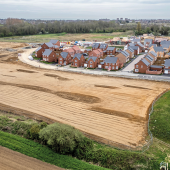Pollen count
Scottish Natural Heritage (SNH) has published new guidance for the planning and construction industry to create a more resilient and nature-rich urban environment. Pollinators including bees, wasps, moths, butterflies and flies are vital for our biodiversity, but face challenges due to changes in land use, habitat loss, diseases, pesticides and climate change. The guide offers advice on how best to fit pollinators into urban design and construction with a series of easy-to-follow steps to suit project budgets and sizes.
Wildflower meadows, flowering trees, hedgerows, nectar-rich plants and herbs, window boxes, green roofs, living walls and sustainable drainage systems can all help expand the habitats of pollinators. They also support biodiversity, improve wellbeing for inhabitants and reduce costs from urban maintenance such as mowing road verges.
For a copy of the guide, contact SNH at [email protected]








